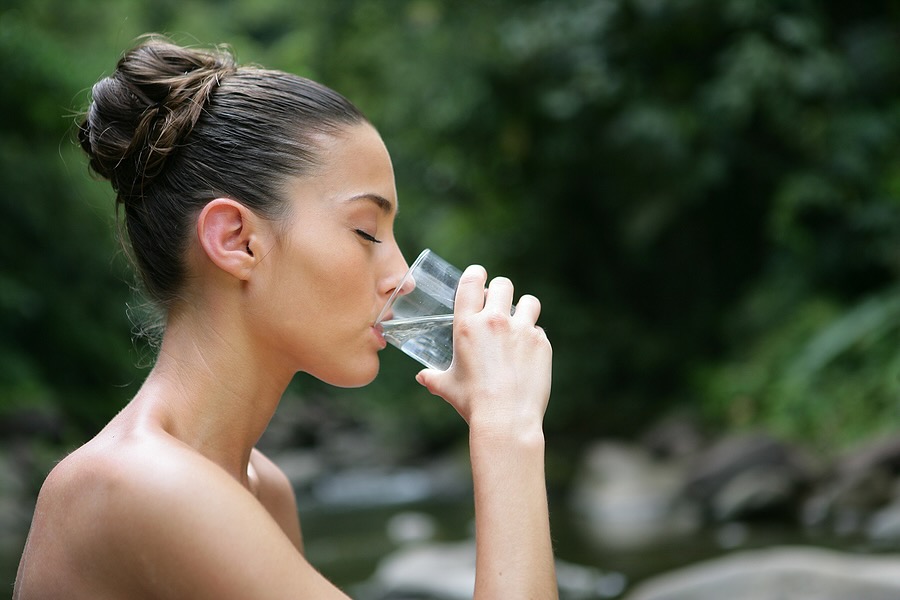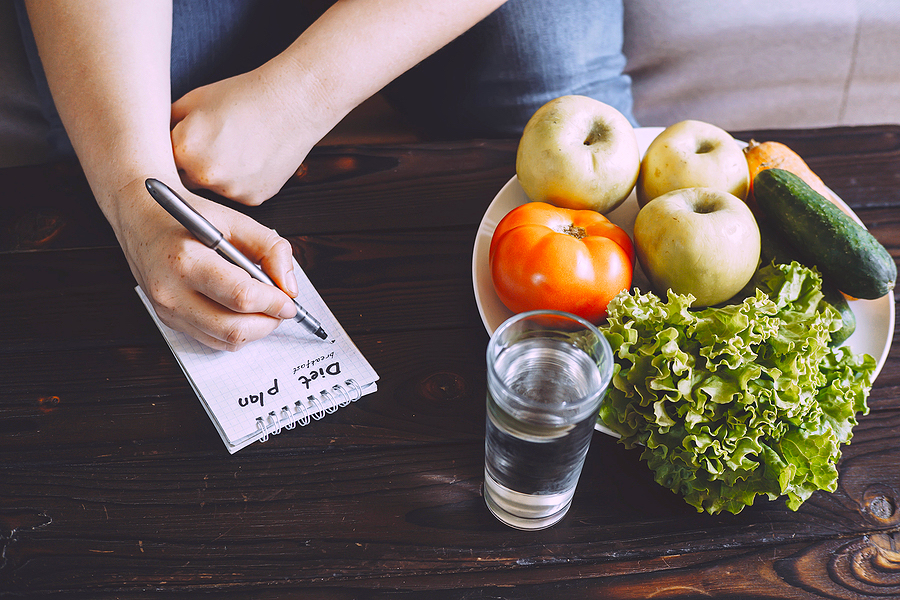- Proper hydration can help with digestion, hormonal balance, and metabolism, all of which can impact weight loss.
- Dehydration has a negative impact on these processes, which can lead to weight gain.
- Symptoms of dehydration include sleeplessness, fatigue, headache, dizziness, lightheadedness, and confusion.
- Water is the best choice for hydration, but it doesn’t have to be boring!
Summer in Maine is short, but so very sweet: beautiful weather, time for the beach or the lake, and gathering with friends. Because the winters can be long and harsh, we treasure every minute of summer in Maine and try to get outside as much as we can to soak in the sunshine (and the vitamin D!).
Whether you’re in Maine or in a place where sunshine and warm weather are present for a longer season, when the temperatures rise it’s critical to pay even closer attention than usual to staying properly hydrated. I’ve had many clients ask what the best options are for this. What should they choose? Is bottled water best, or can they just drink from the tap? What happens when you simply don’t like drinking water?
In this article, I’ll share why hydration is so important in supporting your body through the summer heat – and beyond. Then, I’ll give you a few options for optimal hydration, including what to avoid to keep yourself hydrated and healthy!
Why We Need to Stay Hydrated
Most of my clients have tried to lose weight at some point in time. And they all know, as you likely do too, that it’s not often hard to drop a few pounds when you first begin. They also understand that body weight can fluctuate a few pounds in either direction from day to day. That’s due to changes in your body’s water levels. It’s the reason many people say not to weigh yourself on a daily basis (or even at all), but to instead measure your progress based on how your clothes fit and feel.
More than half our body weight is water and you lose water every day as you go to the bathroom and sweat. You’ll lose more water when the temperature is higher, even if you’re just sitting – but especially if you are active. You also lose water when you have a fever, vomiting or diarrhea, if you are on a diet, if you are pregnant or breastfeeding. Even if you are simply older, you lose more water than a younger person would. That’s because as we age, our brains are less sensitive to hydration levels and thirst signals are not as precise.
The water we lose must be replaced because our bodies need water to survive. Every cell, tissue and organ requires water to perform their functions including joint lubrication, waste removal, and maintaining your desired body temperature, to name a few. If you’re struggling with hormonal balance and having body temperature changes, it’s even more important not to exacerbate this by becoming dehydrated; dehydration will prevent your body from maintaining its proper temperature.
Are you dehydrated? How much water do you really need?
I’ve talked to so many women who have symptoms of sleeplessness, fatigue, headache, dizziness, lightheadedness, or confusion. While these are all common symptoms of hormonal imbalance, many of my patients are surprised to learn that these are also symptoms of dehydration!
Some other signs include dry mouth, lack of tears when crying, lighter than normal urine volume or urine that is dark yellow. If you are experiencing these symptoms, it’s time to increase your fluid intake.
Even if you don’t show obvious symptoms, you may not be as hydrated as you should be. How can you tell if you are well hydrated, and how do you determine how much water you need?
The old adage about water consumption has been that we need to drink 8 8-ounce glasses a day. Back in 1945, when that recommendation was developed, the Food and Nutrition Board suggested 1 ml or 1/5 of a teaspoon of water for every calorie consumed. Since the average diet was about 1900 calories then, that worked out to 64 ounces a day.
Now, the Institute of Medicine sets general water guidelines at 91 ounces, or 2.7 liters a day, for women and 125 ounces, or 3.7 liters, for men. But these guidelines include any and all liquids we drink, even coffee or soda, and the water found in foods we eat as well. They now say that most healthy people can get all the fluids they need from their regular food and drink, without adding multiple extra glasses of water, and that the most important guide should be thirst.
But as some of my patients discover, medications for depression, heart disease, and stomach ulcers can disrupt your thirst signals. Diabetes, and other health conditions, can also disrupt thirst signals – so relying on thirst isn’t always reliable.
I always tell my patients that liquid consumption, much like everything is, bio-individual: some people will need more, some less. One of the best ways to gauge your hydration level is checking your urine: a well-hydrated body will have clear or light yellow urine. If yours is dark yellow or amber-colored, you are likely dehydrated.
What is the best way to stay hydrated?
Because water is a foundation of the human body, drinking pure water is the best way to replace the water your body loses regularly and remain hydrated. But these days, getting pure water is much harder than it should be. Tap water is often fluoridated, which can pose many health concerns including thyroid problems and cancers.
If you drink tap water, you will need to filter it. Whole house filtration systems are available that remove all the chemicals from your water, including your bath water and water from sink faucets. Since we absorb water through our skin as well, these are an excellent investment. Or you can choose to just filter the water from your kitchen sink. If that’s not possible, there are now water bottles with built in filters available that you could refill and keep with you throughout your day.
While bottled water is a convenient option, I don’t recommend it to my clients. In addition to the environmental concerns that massive amounts of plastic are posing, studies have shown that bottled water often contains many of the same chemicals as tap water, which can disrupt your endocrine system and cause health concerns. In addition, plastic bottles leach chemicals into the water when they are exposed to heat. Even if you keep yours in a cool, dark place, it’s very likely they were exposed to heat in transit, in the store or in a warehouse.
If water seems boring, try adding a slice or two of lemon, cucumber or another fruit to it to jazz it up. Keep a pitcher of fruit water handy in your fridge to make it convenient. While any liquid counts in terms of hydration, I don’t recommend soda or juice because of the high sugar content that can impact other areas of health, and make weight loss trickier. Diet soda should always be avoided, since artificial sweeteners pose numerous health concerns .
I also recommend staying away from energy drinks, as they are usually high in caffeine and other stimulants such as ginseng, guarana or taurine. Most processed sports drinks are not much better. They contain very high levels of sugar, may contain caffeine, and often contain artificial dyes and ingredients that may pose health risks.
If you are going to be physically active outside in hot weather, though, it is important to replace the electrolytes your body will lose through excessive sweating. In that case, look for a natural water supplement to add to your filtered water. Ultima Replenisher makes an electrolyte drink powder that has no artificial colors, flavors, or sweeteners. It comes in convenient single serve packs you can carry with you and simply add to your water if needed; my favorite is the lemonade flavor!
While I think it’s best to avoid caffeine, I’ve long maintained that a cup or two of coffee a day is fine. It’s even better if you choose to have it iced in the summer. Either way, it still contributes to your liquid intake. Same with tea: if it’s caffeinated, a cup or two a day, hot or iced, is fine. Green tea (which has lower caffeine) or herbal teas can be even more effective hydrators, especially over ice.
And don’t forget that the food you eat that contains water counts too: soups and broths, vegetables and fruits such as tomatoes, watermelon and even lettuces all contain water as well.
Water loss, hormones and vitamins
If you are losing more water than normal for any of the previously mentioned reasons, you’ll also want to pay extra attention to supporting your body by making sure you get the vitamins, minerals and co-factors needed for your body to remain in optimal health.
While it’s always a good idea to take a high-quality multi-vitamin, since we simply cannot get enough nutrition from our diets today given the way food is produced and marketed, it’s especially important if you are experiencing symptoms of hormonal imbalance. Symptoms like fatigue, hot flashes, anxiety, night sweats, digestive concerns, depression, or fuzzy thinking are your body’s way of telling you it needs extra help and support to get back on track. You don’t have to suffer. Our hormonal balance product has helped thousands of women to finally feel like themselves again – we can help you too!
Lifestyle changes in the summer months, such as being more active outside; exercising more; not sleeping well due to warmer temperatures; eating lighter; or staying up later to fully enjoy the summer days and nights might also require you to provide your body with additional support. Our stressful lives deplete our nutrients, and our food supply is unable to replenish them, so you must take action to heal your body and restore hormonal balance if you want to live symptom-free.
You can feel better – and lose weight! But it won’t happen unless you make the decision to give your body the support it needs. By staying well hydrated, finding ways to reduce stress, making healthy nutrition choices, and taking high quality supplements when necessary, you can enjoy summer – and the rest of the year – to its fullest!
To learn more about our hormonal balance program including our high-quality pharmaceutical grade multi-vitamin, which has helped thousands of women to feel better and restore their health, click here.








